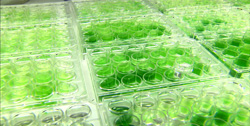DOE Awards UC San Diego Consortium $9 Million for Algal Biofuels Research
June 28, 2010
By Kim McDonald

Cultures of algae growing in Susan Golden's lab at UC San Diego.
Credit: UC San Diego
The U.S. Department of Energy has awarded a consortium of universities and companies headed by biologists at UC San Diego up to $9 million over the next three years to conduct basic research that will pave the way toward making biofuels from algae a viable and competitive alternative to gasoline for our nation's transportation fuel.
The $9 million in federal funds are being supplemented by $3 million from a consortium of biotechnology and energy companies, providing a total of $12 million for the three year research effort that will begin this summer.
"Algae are a promising source of renewable alternative transportation fuels and this award firmly establishes San Diego as a hub for algal biofuels research," said UC San Diego Chancellor Marye Anne Fox.
"This grant as well as other recent algal biofuels awards to local companies over the past year validates San Diego as one of the major centers for algal research in the country," said Stephen Mayfield, a professor of biology and head of the San Diego Center for Algae Biotechnology, a consortium of local research institutions and commercial partners formed last year and known as SD-CAB.

Colonies of cyanobacteria which SD-CAB scientists are studying for their oil-production potential.
Credit: Susan Golden Lab
Algal biofuels research is already having a positive impact on the region's economy. Research on algal biofuels now employs 410 scientists and other workers in San Diego and provides nearly $28.8 million in payroll and $56.2 million in economic activity for the region, according to an economic assessment completed earlier this month by the San Diego Association of Governments, or SANDAG, Service Bureau.
Direct spending on algal biofuels, combined with the additional jobs and spending in related service industries is currently responsible for 784 jobs, $44.6 million in wages and $108.3 million in economic output in the San Diego region, according to the SANDAG study.
Mayfield, who will also lead the DOE research effort, said the $3 million per year in DOE funding will go to research laboratories at UCSD, UC Davis, the University of Nebraska and Rutgers University for research to develop new approaches to algal crop protection, improve nutrient recycling in growing algae as well as for the development of new genetic tools to improve the production of fuel from algae.
"These are the three most important areas right now for the development of algae for biofuel production," he said. "This basic research will enable us to make significant improvements in the production of bioenergy from algae."
The additional $3 million to the project will be provided by seven commercial partners-Sapphire Energy, Sempra Energy, Life Technologies, General Atomics, Chevron, Praxaire and W.R. Grace.

A researcher in Susan Golden's lab at UC San Diego examines streaks of algae.
Credit: UC San Diego
The announcement of the DOE award was made today by U.S. Department of Energy Assistant Secretary for Energy Efficiency and Renewable Energy Cathy Zoi. Funding for the UCSD-led consortium will complement existing algal research, development and demonstration projects supported by DOE's Biomass Program.
"Partnerships such as these allow the unique capabilities of individual entities to be brought together to hasten the development of new technology in algal biofuels," she said in DOE's press release.
The SANDAG analysis was paid for by SD-CAB and CleanTECH San Diego, a non-profit corporation formed to accelerate San Diego's position as a world leader in the clean energy economy.
Visit the SD-CAB website for more information about the center.
Media Contacts:- Kim McDonald (858) 534-7572, [email protected]
- Stephen Mayfield (858) 822-7743, [email protected]
